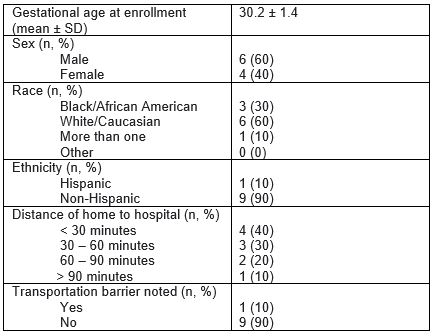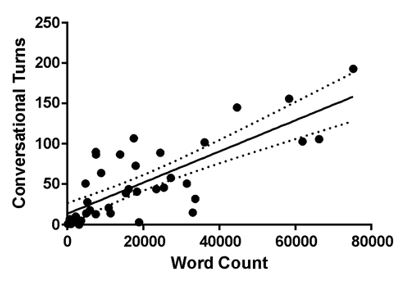Neonatology
Session: Neonatal General 9: Outcomes, Genetics. Ethics
377 - Impact of Parental Speech and Stress on Infant Early Language Skills in Very Preterm Neonates
Monday, May 6, 2024
9:30 AM - 11:30 AM ET
Poster Number: 377
Publication Number: 377.2935
Publication Number: 377.2935

Kelsey Sullivan, MD, FAAP (she/her/hers)
Neonatal-Perinatal Fellow
University of Virginia Health Systems
Charlottesville, Virginia, United States
Presenting Author(s)
Background: Children born preterm are at increased risk of abnormal neurodevelopment including language and social development delays. Increased exposure to parent speech is known to enhance infant language development. Studies have shown a positive association between early language skills such as conversational turns (responsive vocalization to adult speech) and later language and cognitive scores. The impact of stress on parent speech and the association between parent-infant conversational turns and parent stress is not known.
Objective: To study the impact of parental speech on conversational turns in very preterm infants ( < 33 weeks’ gestational age (GA)), and to explore the impact of parental stress and parental perception of the parent-infant relationship on parent word count and infant conversational turns.
Design/Methods: Ongoing single-center, prospective longitudinal cohort pilot study enrolling preterm infants/parents in the first two weeks after birth. Parents are instructed to visit their infants whenever possible while recording their interactions using Language ENvironment Analysis (LENA) devices. In addition, stress, as measured by the Parental Stressor Scale: Neonatal Intensive Care Unit (PSS-NICU), and parent perception of the parent-infant relationship as measured by the PSS-NICU relationship subscore, is assessed periodically throughout NICU admission. Associations between parental word count and infant conversational turns were measured by linear regression analysis. Partial correlations were calculated between conversational turns and PSS-NICU and PSS-NICU relationship subscore.
Results: To date, data from 10 families have been collected and analyzed. Cohort demographics are shown in Table 1. There is a strong positive correlation between parental word count exposure and infant conversational turns regardless of the infant postmenstrual age (r = 0.78, Fig. 1). A moderate negative correlation was demonstrated between conversational turns and PSS-NICU scores (-0.58 for maternal and -0.27 for paternal, Table 2) and PSS-NICU relationship subscores (-0.51 for maternal and -0.22 for paternal, Table 2).
Conclusion(s): These data indicate that very preterm neonates increase their early language output in response to parent speech at any postmenstrual age. Additionally, increased conversational turns appear to be associated with improved PSS-NICU scores, as well as improved parental perception of parent-infant relationship as measured by the PSS-NICU relationship subscore. Data collection is ongoing to confirm these preliminary results.



